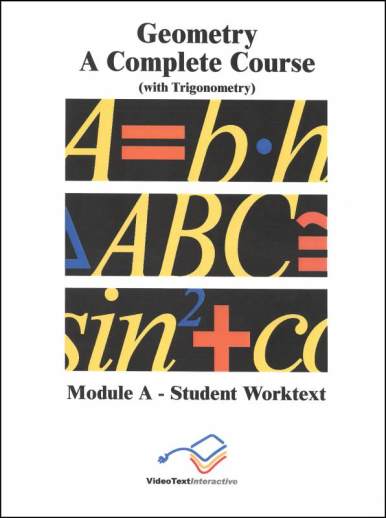We use cookies to make your experience better. To comply with the new e-Privacy directive, we need to ask for your consent to set the cookies. Learn more.
Geometry Module A WorkText
The student worktext offers examples and provides exercises for the student to practice what he has learned. Important concepts are also reviewed. When the exercises have been completed, the student can then use the solution manual (sold separately) to check and correct work. This worktext is for Module A (Unit I). ~ Gina
This instructional system is the best I've seen for students to learn and grasp algebra and geometry. The computer-generated graphics and animation on the DVDs visually bring home the concepts presented in a way that won't soon be forgotten. It would be difficult for any child to fail using this system. It is systematic, incremental, and reinforced with course notes, exercises, quizzes and tests. The emphasis is on conceptual learning so students will be able to apply their knowledge regardless of problem presentation. Although it is meant to be used along with an instructor, if I had to choose a math curriculum to be used by an independent learner, this would be it, hands-down.
The cornerstone of the program is the video instruction. These presentations are very professionally done. Instruction is clear and audio is excellent. Every presenter speaks distinctly and at a moderate pace. One of the instructors and the author of the program is Tom Clark, a math teacher with 30+ years of experience in the classroom and as a district math supervisor. His expertise at reaching and teaching children really comes through in the presentations. Animated graphics complement the audio, showing step-by-step explanation. It would be very difficult to duplicate this quality on a board with a live presenter, especially in the case of 3-D graphics like conic sections and x, y, z axes. Relationships are arranged, rearranged and moved to a coordinate plane with ease, bringing home the thought process and solution steps in a way that would be difficult to achieve without this technology.
For students who aren't math-oriented, the bite-sized increments of instruction make the learning process easy to digest. In school site trial tests, students in classrooms using the VideoText program easily outscored students using conventional textbook and instructor methods. Another plus is the ability for students to play back previous instruction for review. This eliminates the potential for mistakes made due to misunderstandings or faulty memory. It also saves you, the math teacher, from repeating instruction over and over if a child is having a difficult time assimilating it. Even if you are very math oriented, if you have a student who is not, your teaching may not be reaching your child at a level basic enough for them to comprehend. These courses are great at thoroughly laying a foundation then building carefully upon it.
In this system, students first watch the video (without taking notes - those are provided). While the instructions suggest repeatedly pausing the video to discuss and answer posed questions, I did not find this applicable to many of the lessons I watched. You will probably want to watch the first several presentations along with your student to determine whether this will be a necessary step in your lessons. Videos are 5-10 minutes in length. After watching the video, students review the course notes that summarize and recap the concepts and terminology presented. They then work the exercises in the student worktext. Rather unique to this program is the checking of this work by the student, using the provided solution manual. In this way, the child realizes and corrects his own mistakes, learning the correct procedure to follow. Solutions are shown in detail. If needed, he can review the video also. You gauge the student's performance via quizzes taken at the end of each lesson. An "A" and "B" quiz are provided so that you can review and retest if necessary. Tests (again "A" and "B" forms) are provided for each Unit as well. The instructor's guide contains solutions to all quizzes and tests.
The Algebra course is a complete course containing pre-Algebra instruction, the equivalent of both Algebra 1 and 2 (two years of instruction), and 1/2 credit in precalculus (found in module F). In fact, Dr. Clark recommends students take a CLEP or college entrance exam upon completing the Algebra course to place out of a college algebra refresher course. The Geometry course includes a significant amount of Trigonometry instruction. After completing modules A thru E, students can claim 1 credit in geometry. Module F in Geometry is only available online. If a student completes module F, it can be counted as 1/2 credit in Precalculus or Trigonometry.
The complete courses consist of 6 modules, A thru F (Geometry is available in Levels A thru E in DVD format). Module consists of one or more Units of instruction, containing various numbers of lessons (about three months worth of course work per module). Modules are contained in separate boxes which contain video lessons on DVD, course notes, student WorkTexts, Solution Manuals, Progress Tests and Instructor's Guides. Additional student materials are also available below for each module or in complete packs. An online option with a lifetime access to the videos is also available for both algebra and geometry.
Geometry Modules A-E are currently available on DVD. After finishing all modules, students earn 1 credit in geometry. An optional module F is an online course only, which gives students 1/2 credit in precalculus or trigonometry.
| Product Format: | Softcover Book |
|---|---|
| Brand: | VideoText Interactive |
| Grades: | 9-12 |
| ISBN: | 9781596760899 |
| Length in Inches: | 11 |
| Width in Inches: | 8.5 |
| Height in Inches: | 0.5 |
| Weight in Pounds: | 0.7 |

